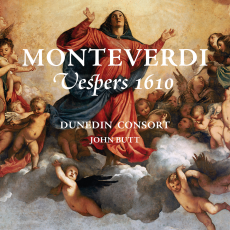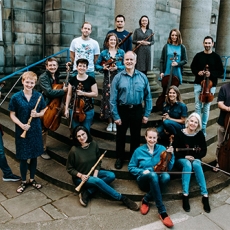Dunedin Consort - Monteverdi: Vespers 1610 - Gramophone
Anyone expecting a John Butt Monteverdi Vespers to be in the liturgical reconstruction mould of Andrew Parrott (or indeed Butt’s own recording of the St John Passion), or to seek a ‘different’ version of the piece (as in his ‘Dublin’ Messiah or E flat version of the Bach Magnificat) can quickly be disabused. Instead he presents it in the customary order with no chant additions, accepting the view that this ‘work’ is a collection of sacred pieces deliberately ordered in the general shape of an ‘imaginary’ Vespers service. In other words, the Vespers as most people know it.
Butt’s other decisions are perhaps more predictable: a consort of solo voices, never rising to more than 10; high-ish pitch with downward transpositions for ‘Lauda Jerusalem’ and the Magnificat; and virtually no instrumental doubling of voices except where Monteverdi actually asked for it. The result is a ‘chamber’ version in which clarity of detail and the beauty of individual voices (recorded fairly closely and in many places clearly recognisable) provide an alternative to the grand gestures and bold colours of other more monumental performances. It also allows for plenty of attention to text, not just in the solo motets but in the larger psalm-settings as well. Not that the work ends up sounding like a set of keening madrigals; the singing in the solo motets is ardent all right, but with an underlying poise, nowhere more memorably than in ‘Audi coelum’, where the tutti entry at ‘omnes’ caresses rather than overwhelms, and, instead of tumbling away, the succeeding pages are bathed in exquisite Marian tenderness.
Butt’s innate ability to shape a movement is regularly on show elsewhere. ‘Dixit Dominus’ intensifies threateningly towards its mention of the day of wrath, ‘Pulchra es’ takes a subtle step up in urgency whenever the second soprano joins in, and the final chorus of the Magnificat builds steadily and calmly to its grand finish. The contours of the music are further delineated by another of Butt’s performance decisions, which is to find tempo relationships which lead to the triple-time sections being about half the speed we have become used to hearing. It is a trend that seems to be gaining a hold – La Compagnia del Madrigale used it in their recent recording (Glossa, 7/17), as did I Fagiolini in their ‘Other Vespers’ (Decca, 7/17) – and further serves to give these Vespers dignity and grace. The sometimes frantic ‘Sonata sopra Sancta Maria’ is quite transformed by it.
The sound is first-rate as ever from Linn, with a sampled Italian chest organ discreetly adding warmth and incisiveness. With so many Vespers recordings out there, this one joins the ranks of those with both a character of its own and something to say.


